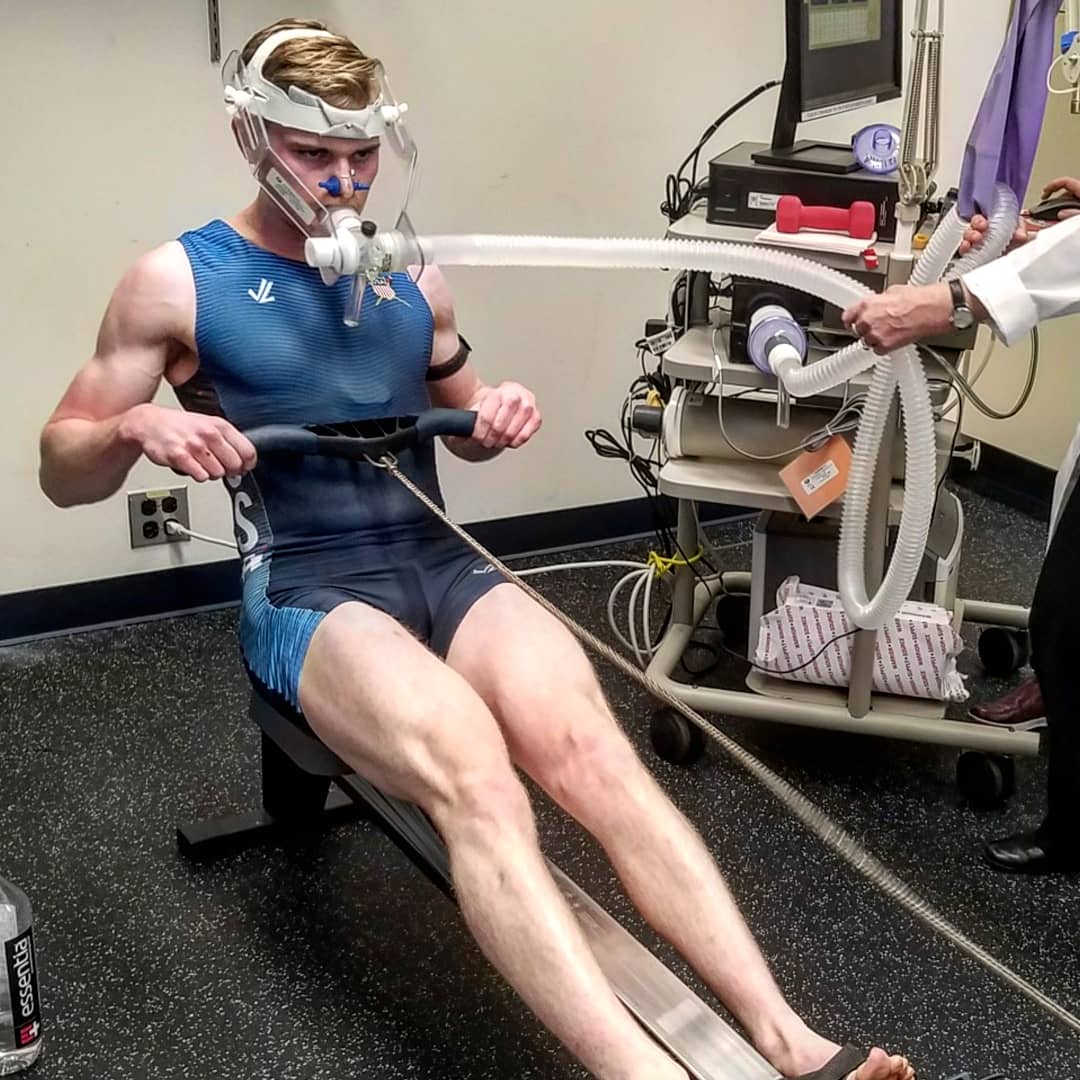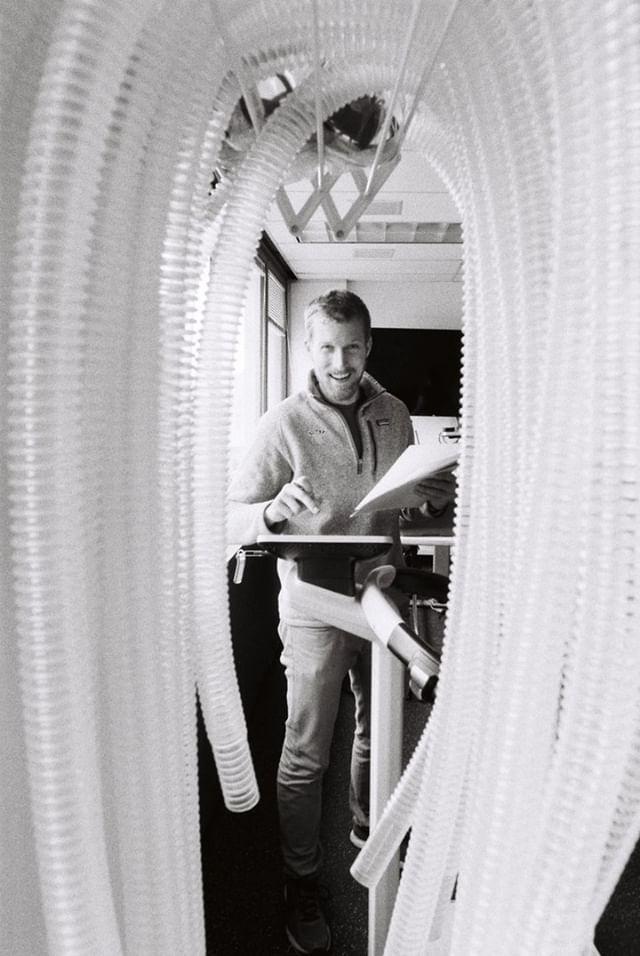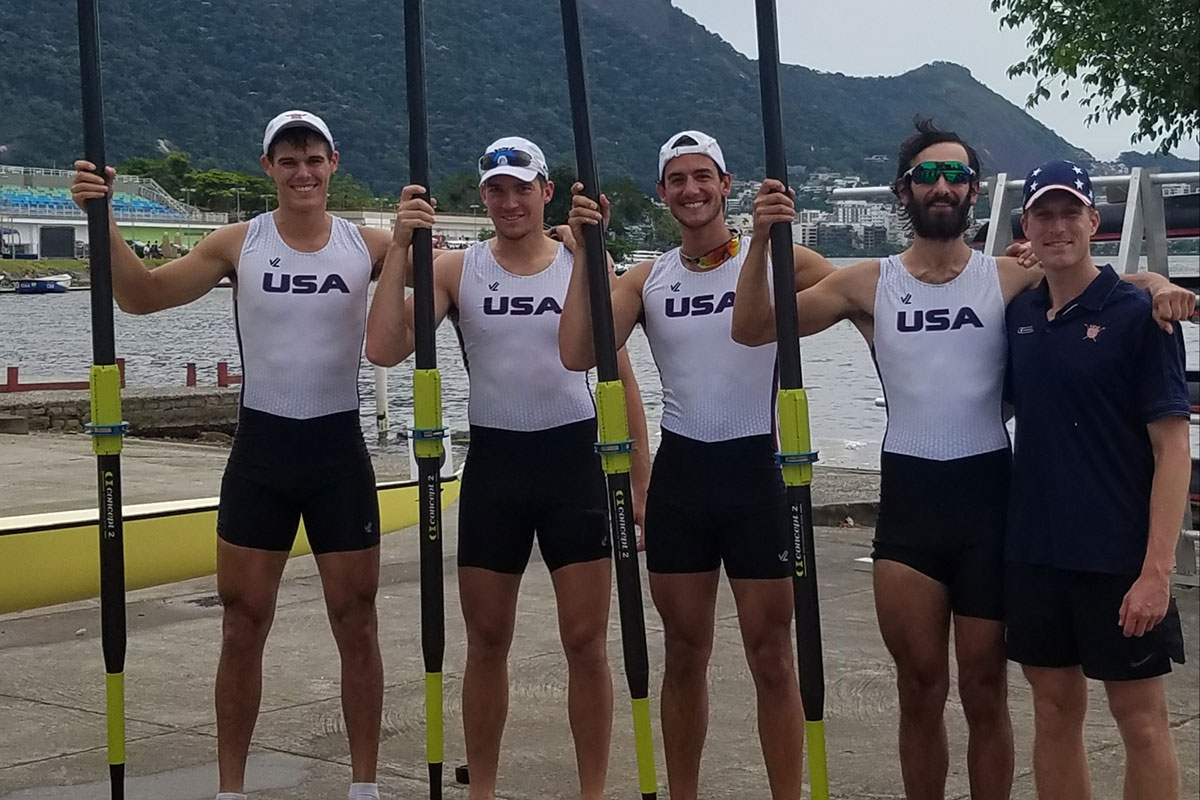It may not be the first thing that comes to people’s minds in connection with Teachers College, but TC does have a history when it comes to competitive sports. Sid Luckman, the legendary 1940s NFL quarterback, earned a bachelor’s degree here. The late Clarence “Big House” Gaines, the great college basketball coach, was also an alum. More recently, Maya Lawrence (M.A. ’10) was part of the U.S. Olympic fencing squad that took home a bronze medal from the 2012 Games.
Now that list includes Nick Dawe, a current student in TC’s Applied Exercise Physiology program, who recently coached a U.S. sculler to victory at the World Rowing Championship. Dawe’s protégé, Sam Melvin, a member of the Columbia University rowing team, took first place in the single sculls division at the Under23 World Rowing Championships in Sarasota, Florida.
Sam Melvin, whom Nick Dawe coaches

CUSTOMIZED TRAINING Rower Sam Melvin, whom Dawe coaches, in the EXerT Clinic. (Photo: Courtesy of Nick Dawe)
“Sam’s world champion gold was the result of his technical skill, physiology and a willingness to experiment in the weeks leading up to and throughout the racing,” said Dawe. “But most of all it was his unbelievable determination and grit. Sam had three extremely challenging races leading up to the final, and he learned and dealt with those challenges exceptionally well.”
Dawe is a member of the TC EXerT Clinic and Applied Physiology Lab team, which has been studying Columbia and New York Athletic Club rowers – Melvin included – as part of an in-depth evaluation of the physiology of elite athletes.

UPPING HIS OWN GAME, TOO Dawe is advancing his rowing coaching career by learning the science behind the sport. (Photo: Courtesy of Nick Dawe)
Under the direction of Professor of Movement Sciences Carol Ewing Garber, EXerT, located on the 10th floor of Thorndike Hall, boasts a Body Composition Analyzer and other cutting-edge equipment to measure aerobic and anaerobic outcomes.
The studies are a win-win for the athletes and EXerT student-researchers alike.
“Being able to refine training and competition strategies based upon a strong understanding of the underlying physiology can optimize athletic performance,” says Ewing Garber. “Laboratory measures provide important data that offer a window into how an individual is responding to exercise, and that understanding, in turn, can guide us in developing a training regimen tailored to the individual. This is particularly critical for elite athletes such as Sam, who compete in races where the difference between the top finishers may be measured in hundredths or thousandths of a second.”
Earlier this year, Dawe and the EXerT team analyzed Melvin’s maximal oxygen uptake, ventilatory threshold, resting metabolic rate and full body composition.
“Nick brought his coaching expertise into the lab and led our EXerT team in developing individualized methods of testing athletes based on their performance, thus improving the precision of the data we obtained and which he then applied to his athletes,” Ewing Garber says.
Dawe had barely a moment to bask in the glory of Melvin’s victory before heading to Lima, Peru, to coach the USA men’s four and eight crews in the mid-August Pan American Games rowing competition. Depleted by a virus that struck the hotel housing U.S. athletes, the rowing team returned home without any medals.
A competitive rower himself, Dawe got hooked on the sport as a Cincinnati high school student. He competed collegiately at Dartmouth and, following graduation, as a member of the U.S. Senior Rowing Team.
Dawe launched his coaching career at Fordham University, and, since 2013, has headed the New York Athletic Club rowing program and served as a U.S. representative for an Australian-based rowing equipment manufacturer. Adding his TC studies to that mix has been a stretch, but he believes his academic work is essential to his career.
“My background in science was limited to what I heard at conferences,” says Dawe, who majored in history at Dartmouth. “I felt something was missing in my coaching and that the science would help me better understand the decisions I was making.”
I felt something was missing in my coaching and that the science would help me better understand the decisions I was making.
—Nick Dawe
A few conversations with Ewing Garber persuaded him that TC was the perfect place to fill the gap – and Melvin’s results at Sarasota confirmed that he’d made the right choice.
“For the first time I came into an international competition with enough knowledge in physiology to confidently back my coaching decisions,” Dawe said. “Sam and I worked to adjust some of his race strategy backed by analysis of previous race data and what I had learned in my courses thus far.
For the first time I came into an international competition with enough knowledge in physiology to confidently back my coaching decisions.
— Nick Dawe
“Each race leading up to the final was about managing recovery in the Florida heat and finding one new thing to improve the result in the next race to eventually make the A final and then win it. I knew he could do it, but everything needed to be executed perfectly. Winning the gold was truly something exceptional that neither of us will ever forget.”
